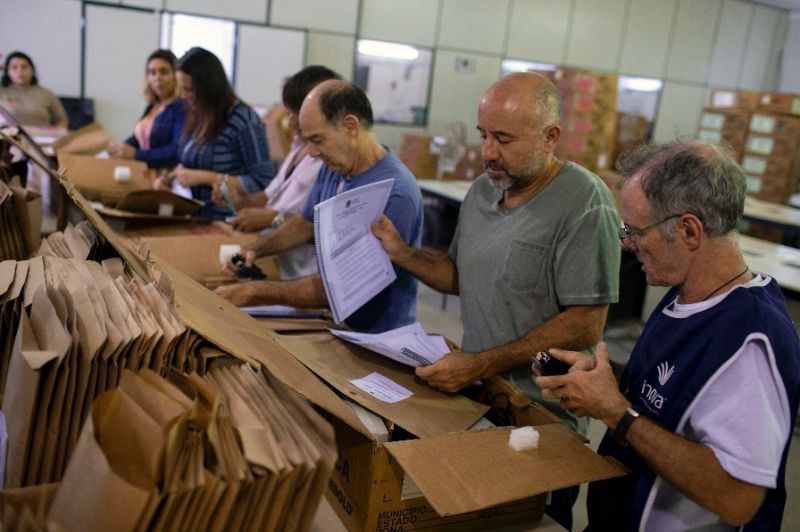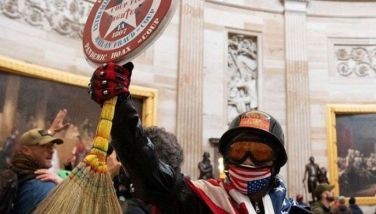Brazil votes for new president, far-right Bolsonaro favorite

Rio de Janeiro - Brazilians cast ballots yesterday in their most divisive presidential election in years, with Jair Bolsonaro, a far-right politician promising an iron-fisted crackdown on crime, the firm favorite in the first round.
Bolsonaro, who has surged in the polls since being stabbed during a campaign rally September 6, predicted a first-round victory as he cast his ballot in western Rio de Janeiro.
While that is possible, analysts say the 63-year-old former paratrooper is more likely to fall short of a majority in yesterday's voting. If so, the contest will go to a run-off on October 28 between the top two candidates.
Bolsonaro's nearest rival is former Sao Paulo mayor Fernando Haddad, a stand-in for former president Luiz Inacio Lula da Silva, who is serving a 12-year sentence for corruption.
Haddad was greeted by neighbors banging pots and pans in protest as he arrived to vote in an upscale district of Brazil's largest city, while supporters chanted their support.
Surveys suggest Bolsonaro, who wants to cut spiraling debt through sweeping privatizations and embrace the United States and Israel, could count on more than one in three voters in the vast Latin American nation.
At least as many in the 147-million-strong electorate reject the veteran federal lawmaker, however.
In Brasilia, Roseli Milhomen, a 53-year-old lawyer, captured the sentiments that have propelled Bolsonaro's populist candidacy.
"We've had enough corruption. We have a very rich country, we cannot let it fall in the wrong hands," she said as she went to vote.
- 'Not him' -
In Rio de Janeiro, Clara Gentil turned out to vote in Copacabana, wearing a T-shirt emblazoned with the message "Not him," the rallying cry of Bolsonaro's opponents.
"Brazilians were manipulated to vote out of hate. So this election is more important than others. Today, there is recession, hunger, people living in the streets, unemployed," she said.
Bolsonaro is known for repeated offensive comments against women, gays and the poor, and for lauding the military dictatorship Brazil shucked off just three decades ago.
The last surveys released late Saturday credited Bolsonaro with 36 percent of voter intentions against 22 percent for Haddad.
With blank and invalid votes stripped out, Bolsonaro could pocket 40-41 percent of the vote to 25 percent for Haddad, polling firms Ibope and Datafolha said.
A run-off was seen as too close to call, given the two-point margin of error, though Bolsonaro was seen with a small edge: 45 percent, to 41-43 percent for Haddad.
Voting began at 8:00 am (1100 GMT) under tight security. Initial results were expected shortly after the last polling stations close at 2200 GMT in the western Amazonian state of Acre.
- Voting marked by 'fear, anger' -
Haddad, 55, has picked up support that still exists for Lula, the Workers Party icon who was declared ineligible from making a comeback after a failed court appeal.
Brazil lived through its economic heyday during Lula's 2003-2010 presidency, but plunged into its worst-ever recession under his chosen successor, Dilma Rousseff. She was impeached and booted from office in 2016 for financial wrongdoing.
Many blame the Workers Party for the country's current economic malaise.
The result is one of the most polarized elections Brazil has seen. Voter rejection of the two leading candidates is bigger than their polled support.
Voters stuck between the far right and the left are likely to make their choice "more from fear or from anger than from conviction," said Geraldo Monteiro, a political analyst at Rio de Janeiro State University.
The run-off round could be "even more radical, maybe with violence," he warned.
The winner will rule the world's eighth biggest economy, a nation with 210 million inhabitants and abundant natural resources whose top trading partner is China.
Should Bolsonaro become president, he will have to form legislative alliances.
His ultraconservative Social Liberal Party has just eight deputies in the outgoing, 513-seat lower house of congress.
After yesterday's general election, in which new federal and state legislatures will also be chosen, it might at best pick up only a handful of seats.
But Bolsonaro, a Catholic, is close to the evangelical church lobby that includes many lawmakers. Deputies linked to Brazil's powerful agro-business lobby are also siding with him.
- A 'clean' candidate -
Bolsonaro's profile and anti-crime agenda got an unintended boost a month ago when he was stabbed by a lone assailant who police said had political motives.
Forced off the campaign trail for weeks, Bolsonaro intensified his use of Facebook, Instagram and Twitter to reach Brazilians.
In the week before the election, his poll figures soared, while Haddad's stalled.
Even those opposed to Bolsonaro admit that he is a "clean" candidate, unsullied by corruption scandals that have mired many other politicians.
The current president, Rousseff's center-right former deputy Michel Temer, is not contesting yesterday's election.
He will leave office at the end of the year as a deeply unpopular figure in a country with 13 million unemployed, climbing public debt and inflation, and record violence.
- Latest
- Trending































